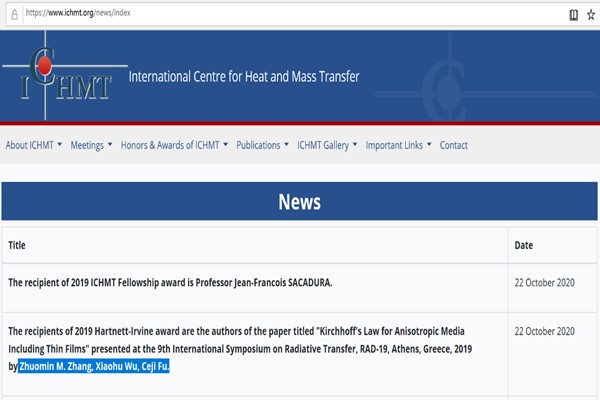Wu Xiaohu, a 2014 Graduate of CUMTB Engineering Mechanics Program, Awarded the 2019 Hartnett-Irvine Award
Editor: Date:2020-11-03 Hits:

According to the latest news from the International Centre for Heat and Mass Transfer (ichmt.org), the 2019 Hartnett-Irvine Award has been presented to Professor Zhuomin M. Zhang of the Georgia Institute of Technology, Associate Researcher Wu Xiaohu of the Shandong Institute of Advanced Technology, and Associate Professor Ceji Fu of Peking University. This award recognizes their contributions to the understanding of Kirchoff’s Law for anisotropic materials.
The International Centre for Heat and Mass Transfer (ICHMT), established in 1968 and supported by UNESCO since 1970, is the foremost international academic organization in the field of heat and mass transfer. The Hartnett-Irvine Award, established in 2007 to honor the founders, Professor Hartnett and Professor Irvine, is awarded annually to one outstanding paper selected from thousands presented at various international conferences organized or co-organized by ICHMT. The three scientists awarded this year are the 13threcipients of the award.
Kirchhoff's Law is one of the most fundamental laws in thermal radiation. Unlike isotropic materials, anisotropic materials exhibit polarization conversion, making the Kirchhoff’s Law more complex in these materials. Notably, magneto-optical materials violate the traditional Kirchhoff’s Law, offering new insights for the control of thermal radiation. Professor Zhuomin M. Zhang and his team theoretically derived a universal Kirchhoff’s Law applicable to both reciprocal and non-reciprocal materials.
Wu Xiaohu, who studied Engineering Mechanics at the School of Mechanics and Civil Engineering at China University of Mining and Technology-Beijing from 2010 to 2014, pursued his PhD at Peking University's College of Engineering under the supervision of Ceji Fu. During his doctoral studies, he was funded by the China Scholarship Council to conduct joint research at the Georgia Institute of Technology under the guidance of Professor Zhuomin M. Zhang.